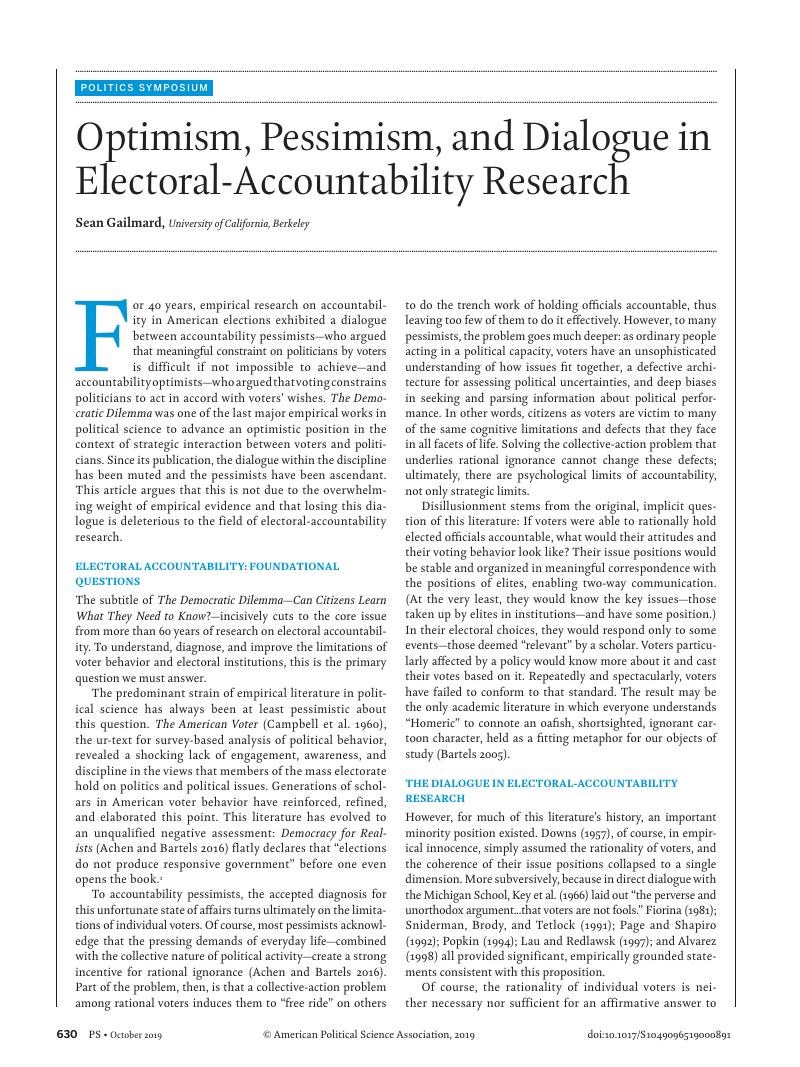No CrossRef data available.
Article contents
Optimism, Pessimism, and Dialogue in Electoral-Accountability Research
Published online by Cambridge University Press: 08 July 2019
Abstract
An abstract is not available for this content so a preview has been provided. Please use the Get access link above for information on how to access this content.

- Type
- Symposium: Can Citizens Learn What They Need to Know? Reflections on The Democratic Dilemma
- Information
- Copyright
- Copyright © American Political Science Association 2019
References
REFERENCES
Achen, Christopher H., and Bartels, Larry M.. 2016. Democracy for Realists: Why Elections Do Not Produce Responsive Government. Princeton, NJ: Princeton University Press.CrossRefGoogle Scholar
Achen, Christopher H., and Bartels, Larry M.. 2018. “Statistics as If Politics Mattered: A Reply to Fowler and Hall.” Journal of Politics 80 (4): 1438–53.CrossRefGoogle Scholar
Alvarez, R. Michael. 1998. Information and Elections. Ann Arbor: University of Michigan Press.Google Scholar
Ashworth, Scott, and Bueno de Mesquita, Ethan. 2014. “Is Voter Competence Good for Voters? Information, Rationality, and Democratic Performance.” American Political Science Review 108 (3): 565–87.CrossRefGoogle Scholar
Ashworth, Scott, Bueno de Mesquita, Ethan, and Friedenberg, Amanda. 2018. “Learning about Voter Rationality.” American Journal of Political Science 62 (1): 37–54.CrossRefGoogle Scholar
Bartels, Larry M. 2005. “Homer Gets a Tax Cut: Inequality and Public Policy in the American Mind.” Perspectives on Politics 3 (1): 15–31.CrossRefGoogle Scholar
Campbell, Angus, Converse, Philip E., Miller, Warren E., and Stokes, Donald E.. 1960. The American Voter . New York: John Wiley.Google Scholar
Caplan, Bryan. 2007. The Myth of the Rational Voter: Why Democracies Choose Bad Policies . Princeton, NJ: Princeton University Press.Google Scholar
Cascio, Elizabeth U., and Washington, Ebonya. 2014. “Valuing the Vote: The Redistribution of Voting Rights and State Funds Following the Voting Rights Act of 1965.” Quarterly Journal of Economics 129 (1): 379–433.CrossRefGoogle Scholar
Druckman, James N. 2004. “Political Preference Formation: Competition, Deliberation, and the (Ir)Relevance of Framing Effects.” American Political Science Review 98 (4): 671–86.CrossRefGoogle Scholar
Fiorina, Morris P. 1981. Retrospective Voting in American National Elections . New Haven, CT: Yale University Press.Google Scholar
Fowler, Anthony. 2018. “Partisan Intoxication or Policy Voting?” Working paper. University of Chicago: Harris School of Public Policy.Google Scholar
Fowler, Anthony and Hall, Andrew B.. 2018. “Do Shark Attacks Influence Presidential Elections? Reassessing a Prominent Finding on Voter Competence.” Journal of Politics 80 (4): 1423–37.CrossRefGoogle Scholar
Fujiwara, Thomas. 2015. “Voting Technology, Political Responsiveness, and Infant Health: Evidence from Brazil.” Econometrica 83 (2): 423–64.CrossRefGoogle Scholar
Gailmard, Sean, and Patty, John W.. 2018. “Preventing Prevention.” American Journal of Political Science 62 (2): 342–352.Google Scholar
Healy, Andrew, and Malhotra, Neil. 2009. “Myopic Voters and Natural Disaster Policy.” American Political Science Review 103 (3): 387–406.CrossRefGoogle Scholar
Key, V. O., et al. 1966. The Responsible Electorate . New York: Belknap Press of Harvard University Press.CrossRefGoogle Scholar
Lau, Richard, and Redlawsk, David. 1997 . “Voting Correctly.” American Political Science Review 91 (3): 585–98.CrossRefGoogle Scholar
Lott, John R. Jr., and , Lawrence W. Kenny. 1999. “Did Women’s Suffrage Change the Size and Scope of Government?” Journal of Political Economy 107 (6): 1163–98.CrossRefGoogle Scholar
Lupia, Arthur, and McCubbins, Michael D.. 1998. The Democratic Dilemma: Can Citizens Learn What They Need to Know? New York: Cambridge University Press.Google Scholar
Miller, Grant. 2008. “Women’s Suffrage, Political Responsiveness, and Child Survival in American History.” Quarterly Journal of Economics 123 (3): 1287–327.CrossRefGoogle ScholarPubMed
Page, Benjamin I., and Shapiro, Robert Y.. 1992. “The Rational Public: Fifty Years of Trends in Americans’ Policy Preferences.” Chicago: University of Chicago Press.Google Scholar
Popkin, Samuel L. 1994. The Reasoning Voter: Communication and Persuasion in Presidential Campaigns . Chicago: University of Chicago Press.Google Scholar
Sniderman, Paul M., Brody, Richard A., and Tetlock, Philip E.. 1991. Reasoning and Choice: Explorations in Political Psychology. New York: Cambridge University Press.CrossRefGoogle Scholar


